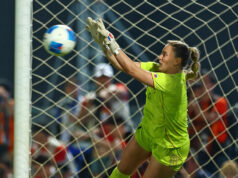A season’s worth of disappointment was etched on Donovan Mitchell’s face as he met members of the media, in the aftermath of Game Seven of the Jazz’s opening-round playoff series. To argue that he was deflated would be an understatement; he entered the 2019-20 campaign determined to do all he could to better their immediate-past, one-and-done postseason showing. And, for a while there, he seemed ready to live up to his own outsized expectations; he sported a more complete playmaking arsenal en route to an All-Star berth, his upward trajectory stalled only by circumstances off the court. Unfortunately, it still proved wanting in the face of the Nuggets’ superior talent base.
Certainly, Mitchell’s performance in the bubble environment over the last couple of months was a reflection of the significant strides he made. Never mind that the coronavirus pandemic threatened to scuttle the season, and given the cause of its suspension, the Jazz’s esprit de corps. Specifically, his relationship with fellow All-Star Rudy Gobert hung in the balance, and for a while during the stoppage in play, he harbored resentment. As things turned out, he was won over by his professionalism and faith to rekindle ties with his teammate. His showing and their work in tandem, if nothing else, underscored that he was in a good place.
Considering how close the Jazz came to upending the higher seeds, Mitchell had cause to wallow in dismay. They had three chances to close the deal. Instead, they became just the 12th team in National Basketball Association annals to snatch defeat from the throes of victory off a three-to-one series lead. In part, the result highlighted their inability to deliver under pressure. In larger measures, however, it was because the Nuggets simply had more weapons at their disposal. And it certainly wasn’t his fault; in fact, he normed a ridiculous 36.3 points (off 52.5% and 51.5% shooting from the field and beyond the three-point line, respectively), five rebounds, and 4.9 assists in the first-round set-to.
True, Mitchell did lose the ball during what was supposed to be the final sequence in Game Seven. He drove to the lane with well over 12 seconds left on the clock, and despite a swarm of defenders lying in wait — leaving him susceptible to precisely the turnover that Gary Harris induced with a swipe from behind. On the other hand, the Jazz wouldn’t have been in position to win at all without his efforts; he appeared to be their only offense early on, and he took on the unenviable role of defending otherwise red-hot Jamal Murray from the get-go.
Naysayers may have reason to claim the Jazz made their job harder with miscue after miscue from Game Five onward. In the dying seconds of the rubber match alone, they had several brain-freeze moments. Among others, there was their useless burning of a timeout, and then their failure to find Mitchell (who lingered backcourt) after the Nuggets’ own cringe-inducing decision to go for a shot (which missed) instead of dribbling the time away. Down two in a low-scoring affair, having Mike Conley (who hitherto went two of 12 from the field and one of five from lone range) take a leaner from distance at the buzzer for the win was simply wrong.
And so Mitchell was rightly overcome with emotion as he tried to come to grips with the outcome. Creditably, he pointed fingers at no one but himself; he vowed to learn from his experience and come back even better. Creditably, the Jazz pledged to give him the max contract he deserves as soon as negotiations can get under way. Moving forward, though, it’s but reasonable to wonder if they’ve gone as far as they can with the roster that they have. They need to assess their future with openness. Having already decided that he’s their foundation piece, they now have to acknowledge that everyone else, Gobert included, should be fair game. Then, and only then, can they find their investment in him amply rewarded.
Anthony L. Cuaycong has been writing Courtside since BusinessWorld introduced a Sports section in 1994. He is a consultant on strategic planning, operations and Human Resources management, corporate communications, and business development.



